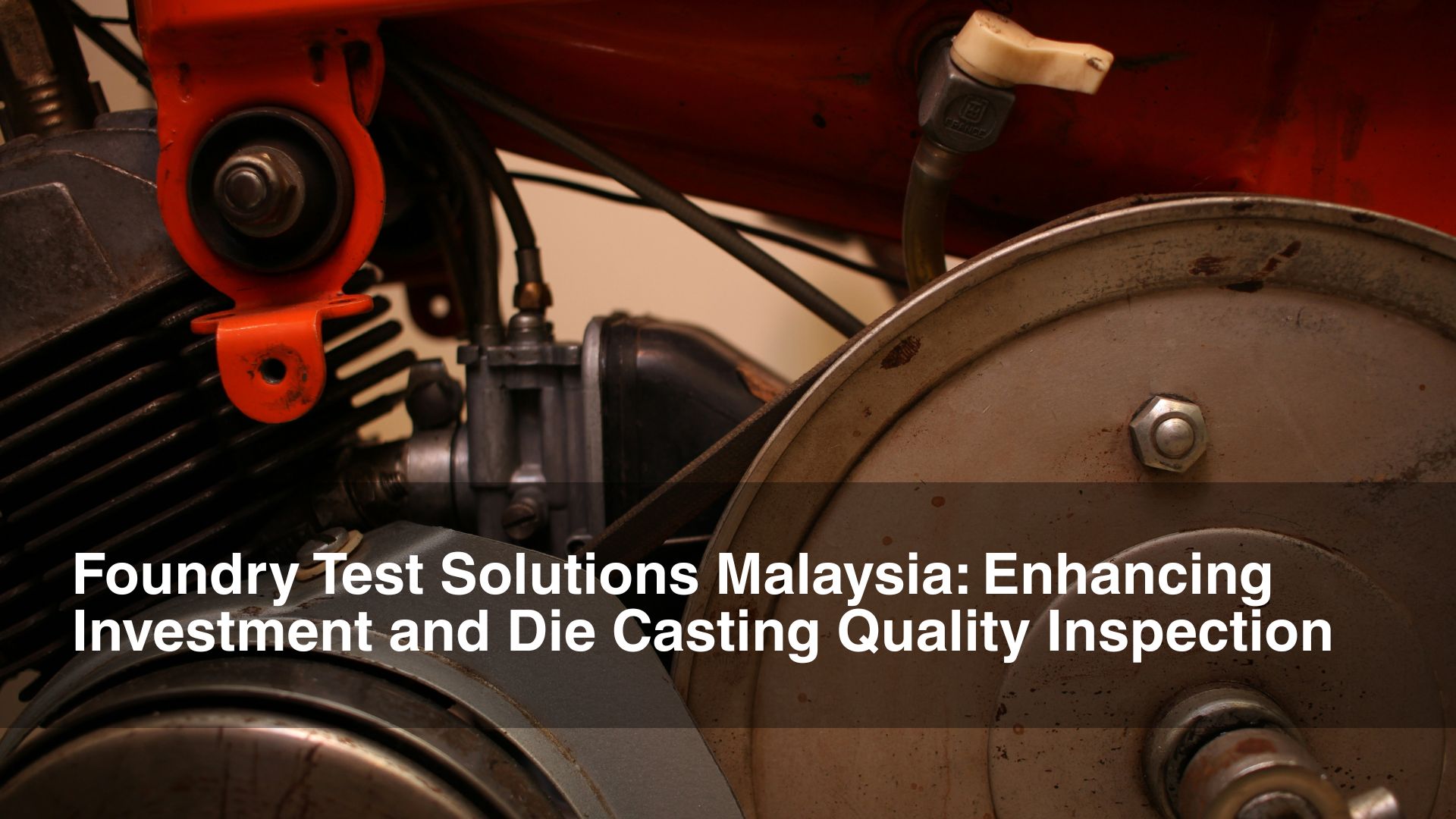Introduction to Foundry Test Solutions Malaysia
Foundry test solutions Malaysia represent a critical component of the country’s manufacturing sector, particularly concerning the fields of investment casting and die casting. These solutions encompass a diverse range of technologies and methodologies employed to ensure the integrity and quality of cast parts, which are essential for various industrial applications. The increase in demand for high-quality components has necessitated the development and implementation of sophisticated testing solutions that can adequately meet the rigorous standards required by manufacturers.
Investment casting, often referred to as precision casting, is a process that enables the production of complex geometries with excellent surface quality. This process benefits significantly from foundry test solutions as they ensure that any potential defects are identified and rectified before the final product reaches the market. Conversely, die-cast components are typically produced in high volumes and require stringent quality control measures to maintain consistency and reliability. In this context, effective testing not only enhances product safety but also maximizes efficiency by minimizing waste and rework.
Various technologies are utilized within foundry test solutions, including non-destructive testing (NDT) methods, metallurgical analysis, and advanced inspection systems such as automated optical inspection (AOI) and X-ray computed tomography (CT). These technologies facilitate a comprehensive evaluation of the materials and processes involved, allowing manufacturers to uphold quality assurance at every stage of production. By integrating such solutions, industries can leverage their benefits to enhance product longevity, optimize performance, and comply with international quality standards.
As Malaysia continues to position itself as a manufacturing hub within Southeast Asia, the significance of foundry test solutions cannot be overstated. By adopting innovative testing methodologies, manufacturers can ensure that their investment and die casting processes meet both domestic and global demand while maintaining a competitive edge in the market.
The Importance of Quality Inspection in Foundry Test Solutions Malaysia
Quality inspection is an integral component of foundry test solutions in Malaysia, particularly in the sectors of investment casting and die-casting. Ensuring that products meet specified standards not only guarantees the reliability of the components but also significantly impacts the financial health of manufacturing businesses. When quality failures occur, the repercussions can be severe, leading to costly reworks, prolonged project timelines, and potential loss of client trust. Hence, implementing rigorous quality inspection protocols is essential.
In the context of foundry operations, investment castings and die-cast parts are utilized in various applications, ranging from automotive to aerospace. Each of these sectors demands high precision and superior quality to meet safety and performance standards. A lapse in quality can result in defective products, which not only affects functionality but can also lead to safety hazards. Thus, the role of quality inspection becomes paramount. By incorporating thorough testing methodologies, manufacturers can detect inconsistencies early in the production process, mitigating risks and ensuring that only optimal components reach the end-users.
Moreover, effective inspection methods contribute to enhanced product reliability and customer satisfaction. When manufacturers in Malaysia employ advanced foundry test solutions, they create a robust quality assurance system that bolsters their competitive edge in the market. Techniques such as non-destructive testing, dimensional verification, and metallurgical analysis are crucial for identifying defects that may not be visible to the naked eye. These practices not only reduce the likelihood of failure but also foster a culture of quality within the organization. In effect, organizations adopting stringent quality inspection measures can experience decreased warranty claims and increased customer loyalty. Ultimately, investing in quality inspection within foundry test solutions is not just a regulatory requirement; it is a strategy that can lead to greater operational efficiency and profitability.
Optical Inspection Techniques in Foundry Test Solutions Malaysia
In the domain of foundry test solutions Malaysia, optical inspection techniques stand out as critical methodologies for ensuring the quality and precision of die casting products. These advanced systems leverage high-resolution cameras coupled with sophisticated lighting technologies to detect surface defects and dimensional inaccuracies within cast components. The application of these techniques plays an indispensable role in maintaining industry standards and enhancing overall product reliability.
The essence of optical inspection lies in its ability to provide detailed analysis of the surface conditions of die cast products. By employing high-definition imaging systems, manufacturers can achieve a level of detail that enables the identification of even the most minute defects, such as scratches, cracks, and porosity. Such defects, if undetected, can compromise the structural integrity and performance of the final product. Furthermore, optical inspection techniques facilitate rapid detection of deviations in dimensions, minimising the risks associated with out-of-specification parts.
One of the key advantages of integrating optical inspection into foundry test solutions in Malaysia is the reduction of time and costs associated with manual inspections. Automated optical systems can perform inspections at speeds that far exceed traditional methods, significantly enhancing throughput while maintaining strict quality control. This not only optimizes operational efficiency but also assists manufacturers in adhering to stringent quality regulations.
Moreover, the utilization of advanced lighting technologies in conjunction with optical systems enhances image clarity and contrast, allowing for more accurate defect identification. Techniques such as structured light or multispectral imaging provide additional data, empowering engineers to make informed decisions regarding manufacturing processes and adjustments as required. In conclusion, the implementation of robust optical inspection techniques within foundry test solutions in Malaysia serves as a cornerstone for quality assurance, ensuring that die casting products meet both functional and aesthetic standards.
Utilizing Laser Technology in Foundry Test Solutions Malaysia
Laser technology has emerged as a pivotal tool in enhancing foundry test solutions in Malaysia, particularly in the realms of investment casting and die casting quality inspection. The precision offered by laser-based measurement tools is unparalleled, providing manufacturers and quality assurance professionals with the ability to capture accurate dimensional data and surface geometries. This capability is essential for ensuring that cast products meet stringent industry standards and specifications.
One of the primary advantages of integrating laser technology into foundry test solutions is its ability to detect minute variations in dimensions. Traditional measurement techniques often struggle to achieve the level of accuracy that laser systems can effortlessly provide. With capabilities such as non-contact measurement, lasers can assess parts without introducing any potential for physical damage or deformation, leading to more reliable data collection. This aspect is particularly crucial in investment casting where the precision of the final product directly correlates to the performance and reliability of the end-use component.
Moreover, the implementation of laser technology facilitates real-time monitoring during the casting process. By integrating laser scanning systems into the production line, manufacturers can instantly assess the quality of the casts as they are created, allowing for immediate corrective actions if deviations from the desired specifications are detected. This proactive approach not only enhances quality control but also reduces material waste, ultimately contributing to more sustainable manufacturing practices in Malaysia’s foundry sector.
In summary, the adoption of laser technology within foundry test solutions in Malaysia represents a significant advancement in quality assurance methodologies. By providing precise data on dimensional variations and surface characteristics, laser-based tools play a vital role in enhancing the integrity and performance of both investment and die casting processes. As the industry continues to evolve, the reliance on such innovative technologies will undoubtedly shape the future of quality inspection in the foundry landscape.
Multi-Sensor Systems in Foundry Test Solutions Malaysia
In recent years, the foundry industry in Malaysia has witnessed significant advancements in quality inspection techniques, primarily driven by the integration of multi-sensor systems. These systems combine various types of sensors, including optical, laser, and tactile sensors, into a cohesive quality inspection framework. This augmentation has led to improved accuracy and efficiency in foundry test solutions Malaysia, addressing the growing demands for precise die casting quality assessments.
The utilization of optical sensors enables high-resolution imaging and real-time analysis of surface characteristics, which is essential for detecting minute defects that could compromise product integrity. Meanwhile, laser sensors facilitate precise measurements and contour mapping, allowing for the identification of discrepancies in dimensions and shapes. When integrated, these sensors work harmoniously to generate a comprehensive inspection profile, significantly reducing the likelihood of human error and leading to more reliable outcomes.
Moreover, multi-sensor systems provide the flexibility to adapt to different materials and casting processes, making them suitable for various applications within the foundry industry. This adaptability ensures that manufacturers can maintain consistent quality standards while optimizing production timelines. Furthermore, the data produced by these systems can be analyzed in real-time, empowering manufacturers with immediate feedback on the quality of their castings and enabling swift corrective actions when necessary.
The benefits of implementing multi-sensor systems in foundry test solutions in Malaysia extend beyond quality assurance alone. Enhanced inspection processes ultimately contribute to cost savings through the reduction of scrap rates and rework requirements. Additionally, by ensuring high-quality output, manufacturers can reinforce their market reputation, build customer trust, and secure long-term business relationships. Therefore, embracing these innovative technologies is pivotal for stakeholders aiming to excel in the competitive landscape of the foundry sector in Malaysia.
Case Studies: Success Stories of Foundry Test Solutions Malaysia
In recent years, several Malaysian foundries have adopted innovative foundry test solutions to enhance their quality inspection processes. These case studies exemplify the transformative impact of technology in this sector.
One prominent case involves a well-established automotive component manufacturer that was struggling with defective castings leading to increased production costs and customer dissatisfaction. By integrating advanced foundry test solutions Malaysia offered, such as Non-Destructive Testing (NDT) and Automated Optical Inspection (AOI), the company was able to identify flaws in castings at an early stage. The specific solution employed allowed them to implement real-time monitoring, significantly reducing the defect rate from 15% to just 2%. The investment in these test solutions resulted in substantial savings and improvement in product quality, solidifying the company’s reputation in the marketplace.
Another success story involves a burgeoning die casting company focused on producing lightweight components for the aerospace sector. The firm faced hurdles in achieving stringent international quality standards. By leveraging advanced thermal imaging and metallurgical analysis from established foundry test solutions Malaysia, they successfully enhanced their inspection processes. The precise measurement and evaluation of the castings allowed them to meet quality specifications and contribute to safer, more reliable aerospace components. Consequently, this led to increased client trust and an expansion of their customer base.
Additionally, a local foundry specializing in marine components adopted integrated foundry test solutions that combined both conventional and automated inspection methods. They recognized the need to minimize lead time while maintaining exceptional quality. By paralleling these methodologies, they achieved a 30% reduction in inspection time without compromising the accuracy or thoroughness of their assessments. This case reflects how adaptive strategies in employing foundry test solutions Malaysia can lead to improved operational efficiency.
These case studies illustrate that investing in advanced foundry test solutions is not merely a trend, but a necessary step for companies in the foundry sector to resolve challenges, improve quality assurance, and ultimately drive growth.
Challenges in Implementing Foundry Test Solutions in Malaysia
Implementing foundry test solutions in Malaysia entails navigating a myriad of challenges that could hinder successful deployment. One of the most significant challenges is cost. Businesses must invest not only in the test solutions themselves but also in the necessary infrastructure and ongoing maintenance. This financial burden can be particularly daunting for smaller companies that may already be operating on thin margins. It is essential for these organizations to weigh the potential benefits against the associated costs to ensure a viable return on investment.
Technology adoption also poses a substantial barrier. Many foundries in Malaysia may not be familiar with the latest technologies or may have been using traditional methods for an extended period. Transitioning to advanced foundry test solutions requires not only significant investment in new equipment but also a commitment to understanding and implementing these new technologies. Companies will need to provide adequate training and support to their employees, which can further increase initial expenses and complicate the transition process.
Furthermore, the requirement for a skilled workforce is critical in the successful implementation of foundry test solutions. The complexity of modern testing procedures demands workers who are not only technically competent but also trained in the nuances of operating sophisticated testing machinery and software. This labor market challenge is particularly pronounced in Malaysia, where there is often a shortage of professionals with the targeted skill sets required. As such, companies may need to invest in workforce development initiatives, which can delay the effective rollout of these solutions.
Finally, integrating new foundry test solutions with existing processes can prove to be a formidable challenge. Companies must evaluate their current operational workflows and determine how best to incorporate these solutions without causing disruptions. This requires a carefully devised strategy and potentially phased implementations, ensuring a smooth transition while maintaining productivity levels. All these factors must be meticulously considered for successful deployment of foundry test solutions in Malaysia.
Future Trends in Foundry Test Solutions Malaysia
The landscape of foundry test solutions in Malaysia is evolving rapidly, driven by significant advancements in technology, shifts in industry demands, and the tightening of regulatory standards. One of the notable trends is the integration of automation and artificial intelligence (AI) into the quality inspection processes. Automation not only enhances efficiency by minimizing manual errors but also accelerates production timelines, thereby addressing the growing demand for swift delivery of high-quality metal products.
As manufacturers seek to improve productivity, the adoption of AI technologies in foundry test solutions is becoming increasingly prevalent. AI systems can analyze vast amounts of data from various stages of die casting and investment processes, identifying defects and inconsistencies that may not be visible to the human eye. This predictive capability allows for real-time adjustments, ultimately leading to higher quality products and reduced waste. In Malaysia, several foundries are beginning to implement these innovative technologies as they strive to remain competitive in a global market.
Moreover, the regulatory environment surrounding foundry operations is becoming more stringent, with greater emphasis on quality and environmental compliance. As these standards evolve, foundry test solutions in Malaysia must adapt accordingly, prompting companies to invest in not only cutting-edge technology but also staff training and development. Incorporating comprehensive quality inspection protocols that align with international standards will be essential in ensuring compliance and maintaining customer trust.
In this dynamic landscape, sustainable practices are gaining momentum. Foundries are increasingly focusing on eco-friendly materials and technologies, which not only align with global sustainability goals but also often lead to better product quality. By embracing these future trends, foundries in Malaysia can enhance their operational efficiencies while ensuring the highest standards in quality inspection and production.
Conclusion: The Path Forward for Foundry Test Solutions Malaysia
As discussed throughout this blog post, the implementation of foundry test solutions in Malaysia plays a pivotal role in enhancing the quality of investment castings and die-cast parts. By adopting advanced testing methodologies, manufacturers can significantly reduce the risk of defects, thereby ensuring that their products meet both domestic and international standards. The integration of technology in this domain not only improves product reliability but also bolsters consumer confidence in the manufacturing sector.
Moreover, the competitive landscape in the metal casting industry necessitates that businesses prioritize quality inspection measures. Advanced foundry test solutions facilitate a streamlined approach to quality control, allowing firms to identify potential issues early in the production process. This proactive stance on quality assurance can lead to reduced operational costs and increased efficiency, ultimately benefiting not just the manufacturers but also the end consumers.
The investment in state-of-the-art testing equipment and training for personnel ensures that Malaysia remains at the forefront of innovation in the casting industry. As the demand for high-quality components continues to grow globally, embracing these foundry test solutions will be essential for local manufacturers aiming to maintain a competitive edge. By leveraging the latest technologies and methodologies in quality inspection, businesses can enhance their manufacturing capabilities and position themselves favorably in the market.
It is clear that the future of foundry test solutions in Malaysia will be shaped by the ongoing commitment of stakeholders to implement effective quality management practices. As industries evolve, the ability to adapt to new standards and technologies will be vital for continued success. Thus, the journey towards quality enhancement through foundry test solutions represents not only an opportunity for growth but also a responsibility towards delivering superior products in an ever-competitive market.










